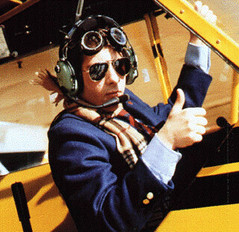Over at USA Today, the paper of record for people who read People, Susan Wloszczyna attempts to profile the spread of Brokeback Mountain-related humor, and how this apparently means that culture is changing, or becoming more tolerant, or something. She interviews Bruce Vilanch, which takes any chance her column might have had to be considered credible and pretty much destroys it; Vilanch remarks on the "irresistible" humor of gay cowboys, etc.
She does make one somewhat relevant comparison in her lead, though she drops the ball after that. She writes that "I wish I knew how to quit you" is the new "Show me the money." And to a greater extent than she realizes, it's true.
The instant ubiquity of "Show me the money" after the 1996 release of Jerry Maguire turned the film's co-star, Cuba Gooding Jr., into a household name, though he's since squandered our collective goodwill by paying us back with Snow Dogs and Boat Trip. But the phrase redefined the film, turning it into a pop culture event, and in doing so it made us all forget that, writer/director Cameron Crowe's past and future glories aside, Jerry Maguire really isn't that great. Sure, it had a few memorable lines, including the other phrase that blitzkrieged the country, "You had me at 'hello'"; Tom Cruise seemed to tone it down a little; Renee Zellweger was still attractive, and could be counted on to act as a female romantic lead without the viewer's calling into question the very nature of reality. Cruise says something sensitive; Renee melts; slow push-in on the camera as the Springsteen music swells; repeat until credits.
But my point isn't that Jerry Maguire is overrated, or not just that; it's that those phrases, especially "Show me the money," blinded us to the film's true mediocre nature. Instead of a movie, we had an idea of a movie; instead of a story, we had a stereotype, not unlike, say, gay cowboys.
Which brings us full circle. Yes, "I wish I knew how to quit you" has, since just after Thanksgiving, been spreading faster and faster throughout culture, and Brokeback humor has spread from everything to Top Gun parodies to hints that He-Man might have had a thing for Skeletor. And, yes, the jokes range from funny and predictable to stupid and predictable, or sometimes just weird and predictable; regardless, there's always a kind of, you know, predictability about them.
But latching onto the jokes and the catchpharses, as entertaining as it might be for 15 minutes, leads us away from the actual nature of the film, only instead of making us think a so-so film is actually good, like with Jerry Maguire, we're starting to think that a great film like Brokeback Mountain is only a middling work. Erring on the side of kindness for Crowe's film is one thing, but reducing Ang Lee's moving love story to a pile of cliches is something else entirely. It's a film with real characters, and real sadness, and the onslaught of "Bareback Mountain" jokes and the like are, an inch at a time, making us forget that.

